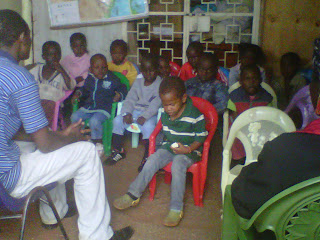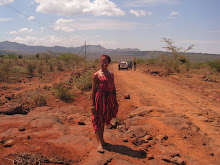Recently I was asked my my author friend Debbie to do a second interview with her. Weekly she interviews authors and posts the interviews on her blog. Bellow is the link for my interview with Debbie.
Enjoy!
http://debbierigaud.com/debbie-rigaud-blog/?p=786
Tuesday 29 November 2011
Sunday 27 November 2011
Ordinary is my Muse
 |
| A small section of our Garden. Planted by the non-gardener me:) |
 |
| Masai bracelets and Silly Bands |
Monday Morning: As the Nairobi sun beams through the Jacaranda trees it beckons me to be enveloped by its newness. Already my children are awake, getting dressed, playing and finding breakfast to eat (who ate all those chocolate chip cookies?). I say hello to the gardeners who help us to take care of the grounds and the animals and thank the guards who have worked all night while my dreams soared past the African sky. They say to me, “There is no difference between you and me. If I take you to my village they will say that you are my sister.” “I am your sister,” I think to myself as smile back and prepare for the day.
Wednesday: On my way to sub at a school. We are unable to drive up the road as police are motioning for us to go the other way. We try to drive up the road anyway and notice that there is a large crowd of people walking and running in our direction. Stones are being thrown and it looks like something has been set on fire in the distance. The angry, yet helpful protesters tell us to wind up our windows and drive in the opposite direction. I think back to the other 3 demonstrations we either caused or were in the middle of while in Jerusalem and the huge red bricks that were being thrown at the cars in one instance at those who were breaking the Sabbath by driving their cars. But I digress. Only later that day would we find out that the protest was in response to police who had murdered an innocent boy on the assumption that he was a thug.
Herein lies a story that resonates with most Westerners. This typical media-driven sensationalism about the continent of Africa sadly frames our worldview of the Motherland. How I struggled to write this knowing that our experience here is characterized by other mundane excitements and ordinary miracles unrecognizable to the above written narrative.
Saturday: We are going to the open market to buy our fruits and vegetables. We drive past several malls and many grocery stores on the way to the busy, mud floor bazaar. Perhaps it’s because we want the “African” rural experience that we venture where the trash looms outside and the monkeys are ever grateful for the abundance of food. Or maybe it’s because the produce is four times cheaper than the stores or maybe it’s because this is where Quincy can buy all of his exotic fruits and sprout the seeds later in preparation for his next project. Whatever the reason, we hold a certain romance with this place. Here we connect the faces to those who grow the food. Such a treasure was rare in our own consumerist, home culture. I see a monkey scamper by. The children ask for shillings to buy sugar cane and maze, “Ninatoka maze tadfathali,” Zahari says with a big grin on his face. He is quite proud of himself as he bites into the blackened, golden kernels.
 |
| Rift Valley |
 |
| Rural House in Limuru |
 |
| "Want to buy a chicken? I also slaughter it for you" |
 |
| "Look Mom I made a volcano!" |
 |
| More artwork made of clay |
 |
| Sunday School |
 |
| At the Market after the Christmas Play |
When Stars hide
When stars hide beneath the clouds those on earth can see
Cracked silhouettes, jagged edges fading glow-what once was brilliance.
When stars dangle in the ray of the sun their glow becomes what once was glory
Dangling in the beauty of a vast element, Venus is no longer the morning star.
When stars begin to wave across the blackened night with a trail of brightness we marvel at this wonder before us.
While we wonder and marvel, this star will quickly be no more.
What is this glimmering feature that hangs in the sky, encompassing rainbow’s blush?
While all of them light up the sky with midnight’s orchestra, only some starlight songs are called by name.
While thousands of illuminations dangle and dance along galaxy’s stage, the curtain of time will soon conclude this theatrical production.
By Joanne Ball-Burgess
Sunday 13 November 2011
How to be an Expert on Africa?
I’ve been laughing hysterically while reading the book, “How to Write About Africa” by Binyavanga Waninaina. This little, literary masterpiece takes a satirical look at the way westerners view Africa. Waninaina says in his book that when referring to Africa broad generalizations are good, hence the reference to the whole continent rather than the particular country where I am living. If you remember, at the commencement of this blog I stated emphatically that I am in no way an expert on Africa however today I feel differently about my position as a spokes person for the continent having lived here now for 3 months. As a newly self-affirmed expert, I think that it would be a good idea to share the laughable wisdom that I have acquired in my ascension to Africa-Yoda status.
Here is my own highly subjective list of expert advice on Kenya.
1. Ugali (looks like stiff cornmeal) -you must eat it. You can eat it with lunch. You can eat it with dinner. You can even eat it with rice but you must eat it-otherwise you really haven’t eaten.
2. The term “black muzungu” (muzungu means foreigner) is an oxymoron. Those who find themselves in this category live in an ethereal world.
3. If you are a black muzungu (ethereal, oxymoronic category mentioned above) and in the distance you see a missionary approaching, immediately let him know that you are a Westerner and he will assume that you do not need to be evangelized by virtue of your birthplace. White people in African do not need to be evangelized.
4. In addition to employing house help, a driver, a nanny a guard and a gardener you must also employ a middle-aged gecko to keep the mosquito population inside the house to a minimum. You must agree to house the gecko and feed it for the agreement to work. At any time if the neighbor’s house acquires more mosquitoes the gecko may abandon his place of employment in search of bigger and better work opportunities.
5. No matter how much the urge impresses upon you, refrain from breaking out in your best known traditional African dance (hands and legs flailing wildly in the opposite direction) if you happen to be in a club and you suddenly hear a 2010 World Cup song. The Kenyans will most likely be doing the Dougie http://en.wikipedia.org/wiki/Dougie.
6. Speaking of dance, I have come to discover that salsa is the national dance of Nairobi and Indian chapatti and chicken pilau are the national dishes following closely behind (the) ugali.
7. The barometer for how well you drive is measured by the number of Matatos (crazy van drivers) you can enrage on any given day. Quincy has perfected this art. You must ask him how to acquire matato-enraging Yoda status.
8. Do not move to Nairobi if you are looking to express your blackness by wearing an afro, twists, cornrows or any hairstyle that resembles Kathleen Cleaver, Lauryn Hill or Erykah Badu. Wearing a wig is the professional hairstyle of choice-even if it appears to be on backwards or sideways during the mid week.
9. When asked about your life in Kenya, immediately mention Al-Shabaab, grenade slinging Africans (nice broad generalization), and contraband sugar by Somali pirates. This will keep frememies, in-laws and other unwanted guest from visiting.
Subscribe to:
Posts (Atom)




